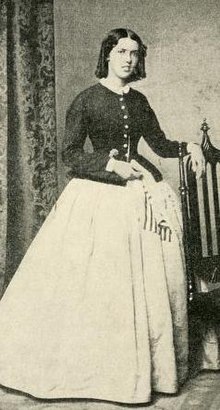Elida Rumsey
Elida Rumsey | |
|---|---|
 Elida Rumsey in 1862, from an 1897 publication | |
| Born | June 26, 1842 New York City, US |
| Died | June 17, 1919 Boston, Massachusetts, US |
| Known for | Civil War nursing |
Elida B. Rumsey (June 6, 1842 – June 17, 1919), also referred to by her married name, Elida Fowle, was a singer, philanthropist, and Union nurse during the American Civil War. Too young to join Dorothea Dix's army nursing service, Rumsey volunteered for three years of the war.[1]
Early life
[edit]Elida Barker Rumsey was born in New York City on June 6, 1842, the daughter of John Wickliffe Rumsey and Mary Agnes Underhill Rumsey.[2] Her father owned a hosiery shop, and later worked in banking.[3][4] As a child, Rumsey's parents moved to Washington, D.C. which began Rumsey's interest in political action.[5] At the time of southern secession, Rumsey was engaged to John A. Fowle who was employed in the Navy. Because of their closeness to the capital and Fowle's work, the couple was interested in serving in the Civil War, particularly in a philanthropic manner.[5]
Civil War Service
[edit]In November 1861, Rumsey began her hospital service. She worked for the Union Army specifically, but was known to help and serve any injured soldier regardless of their loyalties.[5]
In addition to nursing, Rumsey used her singing voice towards the war effort.[1][5] She sang to a crowd of soldiers at a prisoner exchange, in an effort to lift their spirits, as well as at Sunday evening prayer groups to help raise money for the Soldiers' Free Library.[5] Rumsey would often stand on the rebel flag while singing The Star-Spangled Banner in an effort to rouse the audience.[5] Among her other performances, she was said to be the first person to sing "Battle Hymn of the Republic" in a public venue, in Washington, D.C.[2]
Rumsey served in numerous hospitals in the D.C. area for a total of three years.[1] She made crutches and canes for wounded soldiers which were stored in the Soldiers' Free Library along with other donations,[6] which she helped to organize and fund.[4][5][7] She also took supplies and over four hundred loaves of bread to the Second Battle of Bull Run. En route to the battle, she and her husband came across a small cabin which they turned into a makeshift hospital.[1][5] Rumsey carried water for the patients from over two miles away. She left the war with her own scars from blood poisoning.[5]
Personal life
[edit]Elida Rumsey married John Allen Fowle in 1863, on the floor of the U.S. House of Representatives, the same day the Soldiers' Free Library building was dedicated in Washington, D.C.[4][8] The couple moved to Brooklyn after the war, where they were active in the Congregational church led by Henry Ward Beecher. They moved to Dorchester, Massachusetts in 1877. They raised four children together, including a war orphan, Jeannie, whom they adopted; a fifth child died young.[4] They marked their fiftieth wedding anniversary in 1913, with a reception at the Massachusetts State House.[9]
In her later years, Elida Rumsey Fowle was active in veterans' organizations in New England, and founded the Grandchildren of Veterans of the Civil War. She started another free library, volunteered at a hospital, and worked in various charity homes for aged women, intemperate women, working women, aged couples.[2] She was widowed when John A. Fowle died in 1916,[10] and she died in 1919, aged 77 years, in Dorchester.[3][11]
In popular culture
[edit]In 1913, Rumsey's story was fictionalized for a silent film, Song Bird of the North. The Rumsey character was played by Anita Stewart.[3][12]
References
[edit]- ^ a b c d Hall, Richard H. (2006). Women on the Civil War Battlefront. Lawrence: University Press of Kansas. p. 255. ISBN 9780700614370.
- ^ a b c Howe, Julia Ward; Graves, Mary Hannah (1904). Representative Women of New England. New England Historical Publishing Company. pp. 84–87.
Elida Rumsey.
- ^ a b c Coddington, Ronald S. "Elida Rumsey Fowle: Songbird of the North". Library of Congress Research Guides: Civil War Men and Women: Glimpses of Their Lives Through Photography. Retrieved 2019-09-01.
- ^ a b c d James, Edward T.; James, Janet Wilson; Boyer, Paul S.; College, Radcliffe (1971). "Elida Barker Rumsey Fowle (Robert Lovett)". Notable American Women, 1607-1950: A Biographical Dictionary. Harvard University Press. pp. 652–654. ISBN 9780674627345.
Elida Rumsey.
- ^ a b c d e f g h i Holland, Mary Gardner (1897). Our Army Nurses : Interesting sketches and photographs of over one hundred of the noble women who served in hospitals and on battlefields during our late Civil War, 1861-65. Lincoln Financial Foundation Collection. Boston : Lounsbery, Nichols & Worth. pp. 66–78.
- ^ "Soldiers' Free Library in Washington". Burlington Daily Times. January 9, 1863. p. 2. Retrieved September 1, 2019 – via Newspapers.com.
- ^ Moore, Frank (1866). Women of the War; their heroism and self-sacrifice ... Illustrated, etc. S.S. Scranton. pp. 91–108.
Elida Rumsey.
- ^ Sturgis, Dinah (August 14, 1890). "Her Bridal Song was the 'Star-Spangled Banner'". The Boston Globe. p. 12. Retrieved September 1, 2019 – via Newspapers.com.
- ^ "Reception in Hall of Flags". The Boston Globe. March 1, 1913. p. 2. Retrieved September 1, 2019 – via Newspapers.com.
- ^ "Dies on 90th Birthday". The Boston Globe. April 5, 1916. p. 2. Retrieved September 1, 2019 – via Newspapers.com.
- ^ "Mrs Fowle, Civil War Nurse, Dead". The Boston Globe. June 19, 1919. p. 3. Retrieved September 1, 2019 – via Newspapers.com.
- ^ "Elida Rumsey Sang for Pres. Lincoln". The Times-Recorder. July 4, 1913. p. 3. Retrieved September 1, 2019 – via Newspapers.com.
External links
[edit]- Song Bird of the North at IMDb
- Catalogue of Civil War Relics, 1862-1863-1864 donated by John A. Fowle and Elida Rumsey Fowle; included records of the Soldiers' Free Library.
